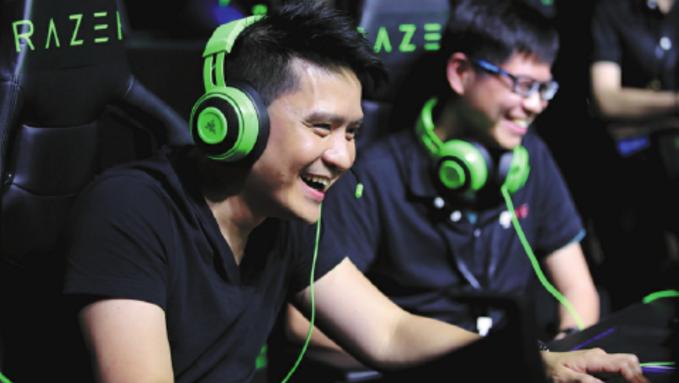Brand logo gamers keep as tattoo


Led by Min-Liang Tan, Razer makes gaming the fastest-growing segment of entertainment industry
"There are only two brands in the world that can make fans get their logo tattooed on their bodies. One is Apple. The other is Razer," said Min-Liang Tan, co-founder and CEO of the listed company.
The 2005 vintage brand is considered the world's best in gaming-related products like mice, keyboards and laptops; recently, the company launched its gaming laptop Razer Blade in Beijing with online shopping behemoth JD. But Tan has none of the airs that you might expect from CEO of a successful startup.
He sauntered into the interview room in a figure-hugging casual black T-shirt, jeans and a pair of white sneakers, spread his arm around the sofa to settle comfortably. CEO or a normal big boy? You might have wondered that but for a crowd of fans waiting outside.
For die-hard gamers - Tan includes himself among that tribe - Razer's logo of triple-headed snake with blazing green light is as sacred as Hermes to fashionistas and premium Russian caviar to foodies. In China, Razer is nicknamed the "light factory" for its signature chroma glare.
Calling himself a "chief gamer" rather than CEO or a businessman, Tan brings to the trade his insights as well as meticulous attention to detail. He seems to know intuitively what gamers need to excel in their domain.
"When I founded Razer, there was no such concept as esports industry," said Tan. "I just liked gaming since my childhood, I spent lots of time on games, and even now with heavy load of work to do, I still spend one hour on gaming with colleagues, to experience the game and discuss how to improve user experience."
He graduated in law from the National University of Singapore. After working as an intellectual property lawyer for a few years, Tan decided to venture into the gaming industry without a second thought.
The company has over 50 million registered users and netted $517.9 million from sales in 2017. Another $596 million was raised from its initial public offering in December 2017. In China, its sales performance topped the gaming equipment category on JD many times.
The company made a bold move in its business by tapping into the gamer phone product category in 2017. The Razer Phone made its debut last November and became an instant success among gamers.
Many have warned Tan against what they thought was a risky move, but being a devoted gamer himself, he decided to bet a fortune on the project.
"Many said to me that if I don't invest in the Razer Phone, the company will certainly profit a lot this year. Analysts also said there were no previous products and market data to learn from, so better not do it," he said. "But I did it anyway because I believe we understand gamers more than anyone else. If you do it after other companies, then you will always be a follower, not a pioneer."
Tan showed absolute confidence in the future.
"There would be 2.7 billion active gamers in the world in 2021 from 2.1 billion in 2016. The gaming industry is already the fastest-growing entertainment business," Tan said. "In 2016, the industry's revenue had surpassed movie and music, reaching $101.1 billion. Gaming will soon be an indispensable part of millennials' life.
"In 2017, 60 million people watched or livestreamed the League of Legends final, outnumbering the audience of the NBA finals and the Oscars combined."
Tan believes the Chinese market is going to be huge. According to iResearch Inc, the esports industry's sales in China reached 65 billion yuan ($10.16 billion) in 2017. The market size is believed to grow by a third this year.
"China owns the world's largest esports audience. In 2016, there were 106 million people watching related competitions," he said. "We predict at least till 2021, China will still be home to the world's largest number of gaming fans, with their number reaching 218 million. There is a huge potential for the industry."
According to Newzoo, a global consultancy in games, esports and the mobile market, Razer is currently the No 1 gamer lifestyle brand, gaming device brand and esports brand in China in terms of both awareness and preference.
"We hope to explore the potential in the esports and gaming industry with our business partners," Tan said.




































